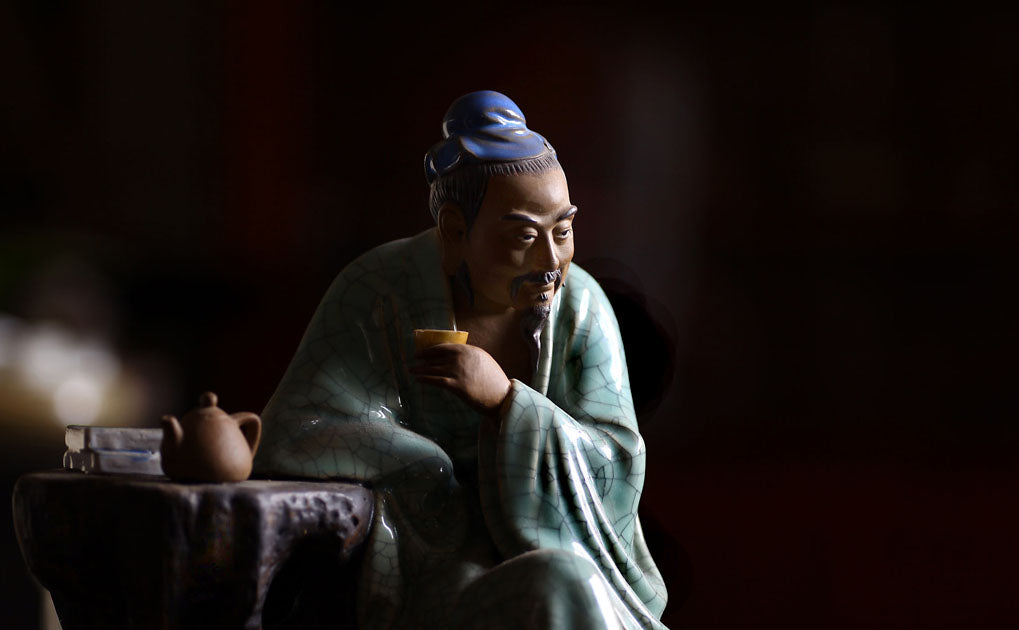
Lu Yu - "The Sage of Tea"
Share
Let’s explore Lu Yu’s story in a more relaxed and personal way—as if you were listening to a story about an old friend who changed how people drink tea forever.
Who Was Lu Yu?
Imagine someone who grew up a bit wild—curious about everything, but stuck living with a strict guardian. That’s how Lu Yu’s life began. Orphaned as a child, he was taken in by a Buddhist monk, who hoped he’d grow up to become a proper monk himself. But Lu Yu? Nah. He wasn’t into chanting and rituals. He had a mind of his own—curious, artistic, and a bit stubborn. He was more interested in books, nature, and finding beauty in the small things, like the perfect cup of tea.
When Lu Yu got older, he left the monastery to find his way in the world. He didn’t have a set plan, but he knew one thing: life was too short to be spent doing things he didn’t love. And what did he love? Tea. Not just drinking it, but understanding every little thing about it.

Tea as a Passion, Not Just a Drink
At that time, people were already drinking tea, but it wasn’t a big cultural thing yet—just something you sipped for health or during casual conversations. Lu Yu saw tea differently. He thought tea had the power to slow down time. A good cup could make people pause, breathe, and appreciate life’s small moments. That idea really clicked with him.
So Lu Yu hit the road. He spent years traveling all over China, learning everything he could about tea—how it grew, how it was picked, and how the taste changed depending on the soil or water. He probably tasted more tea than any of us ever will! And as he went along, he jotted down notes and observations, slowly building what would become his life’s work: Cha Jing.

The Man Behind the Masterpiece
Lu Yu wasn’t just obsessed with tea—he also loved nature, solitude, and quiet friendships. He would meet with fellow scholars, artists, and monks, and they’d sit together, drinking tea under the moon, talking about poetry, life, and philosophy. Those moments gave him inspiration for Cha Jing, not just as a technical manual, but as a celebration of the art of living.
Even though he became famous for his tea knowledge, Lu Yu stayed humble. He didn’t care for fancy clothes or riches. His life was simple, just like the tea he loved. He believed that when tea is made with care—whether it’s in a palace or a small hut—it could bring a kind of peace that’s hard to find elsewhere.
Why Does Lu Yu Matter?
You know how, today, people talk about mindfulness, slowing down, and being present in the moment? Lu Yu was doing that over a thousand years ago—through tea. He taught people that tea isn’t just about the drink; it’s about everything that goes into it:
- How you boil the water matters (he liked it just right, not too fast or too slow).
- The utensils you use matter (he believed beauty adds to the experience).
- Even the water itself matters (legend has it, he could tell the difference between river water and well water just by taste!).

The “Tea Saint” Legacy
The cool thing about Lu Yu is that his ideas didn’t stop with him. The way he thought about tea spread across China—and later to Japan and Korea, where tea ceremonies became a way of life. In Japan, they call it "chanoyu"—the art of tea, which carries a lot of the same principles Lu Yu talked about: simplicity, harmony, and respect.
Even today, tea lovers see Lu Yu as a hero. Tea festivals are held in his honor, and you can find statues and temples dedicated to him in places he lived or traveled through. He’s like the patron saint of anyone who’s ever taken a deep breath and found joy in the quiet moments with a warm cup of tea.

A Warm Cup of Wisdom
Lu Yu’s story reminds us that you don’t need big, flashy things to be happy. Life’s magic can be found in the little moments—like making a cup of tea the right way, sharing it with a friend, or just sitting quietly and watching the steam rise. That’s what Lu Yu taught: when you focus on the small things and do them with care, they become special.
So next time you make yourself a cup of tea, think of Lu Yu. Take your time. Watch the water boil. Smell the leaves as they steep. Sip slowly. And for just a moment, let everything else fall away.
That’s what Lu Yu would have wanted. Because a good life, like a good cup of tea, is all about the little things.
